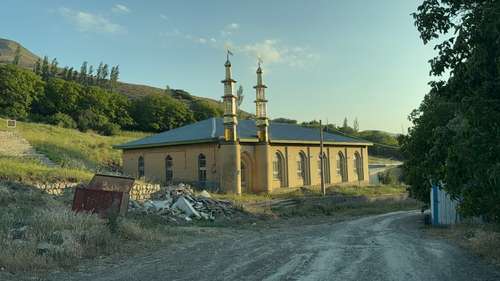The recent announcement of a new mosque construction in one of Cumbria's quaint towns has stirred up a wave of community tensions. Different voices in the community have begun to clash over issues ranging from cultural implications to zoning issues. It’s a reminder that even in small towns, debates over religious freedom and neighborhood concerns can quickly spark a full-blown community debate.
Every community faces its challenges, but this new construction project has pushed local politics and public opinion to the forefront. Some see this project as a necessary step toward enhancing interfaith relations, while others worry about the future dynamics of their neighborhood. With heated conversations happening over local cafes and social media, you can almost hear the clash of opinions like distant thunder over a stormy sea.
Rising Community Tensions
There has been a significant uptick in community tensions surrounding the new mosque construction. Residents who are concerned about increased noise and potential shifts in local customs have voiced their worries through protests and online petitions. These worries are labeled by some as a construction conflict infused with religious tensions.
In some corners, community conflict is unfolding like a tug-of-war between progressive ideas and traditional views. Many argue that the building of a religious building should reflect the local community’s spirit and adhere to established zoning issues. For a while now, many locals have felt that their voices are being drowned out in decisions that affect their everyday lives. It is almost as if every brick laid is a reminder of the ongoing cultural tensions.
As some residents raise concerns about what they describe as an unwanted cultural change, others defend the project as an exercise in religious freedom that celebrates diversity. The debate brings to mind the age-old question: Can progress and tradition coexist harmoniously?
Neighborhood Concerns and Zoning Issues
Neighborhood concerns have taken center stage as local residents express their discontent with the proposed mosque location. Some worry that the increased traffic and noise accompanying the construction project will negatively impact their quality of life. Their worry is echoed by neighbors who mention personal stories of disrupted sleep and changed neighborhood dynamics.
Local zoning issues play a critical role in this construction conflict. The details of planning permissions and adherence to local regulations have become a major focal point in community discussions. How do you weigh the needs of a small town with its historical roots against the demands of a changing society? Many find themselves torn between supporting interfaith relations and preserving the neighborhood's long-standing traditions.
The debate intensifies when residents point to the irony of how a religious building, intended to promote peace, also breeds division. Some community members recall previous instances where infrastructure projects led to unexpected disruptions. These discussions often include mentions of the potential impact on property values and public purity, adding another layer of anxiety to an already charged atmosphere.
Interfaith Relations and a Call for Dialogue
The mosque construction project is not solely the battleground for zoning issues; it also raises critical questions about interfaith relations within the local community. Many citizens see the project as an opportunity for positive dialogue among diverse groups—a chance to bridge gaps through conversation rather than conflict.
There is a growing sentiment among several local advocates that the debate over this new mosque should inspire more inclusive interfaith activities. Community leaders and faith representatives have organized forums and town hall meetings to address concerns, promote understanding, and clear up misinformation. When you sit down for a heart-to-heart conversation with someone who holds a different view, it can feel like you’re peeling away unfamiliar layers to reveal common ground.
One attendee at a recent town hall remarked how such debates remind everyone of the importance of communication in resolving cultural tensions. This plea for dialogue is echoed by many who believe that proactive community response is the key to mitigating religious tensions. Instead of focusing on differences, some residents suggest focusing on shared values like respect, compassion, and coexistence. In a way, this call to engage and listen to one another paves the road to healthier community relations.
The local mosque debate, which once seemed like an issue of construction conflict, has now spurred a broader discussion on religious building rights and community impact. It’s heartening to see people setting aside hostilities to explore ways to benefit both religious freedom and neighborhood integrity.
The Broader Implications for the Local Community
Looking at the larger picture, this controversy touches on many aspects of multicultural integration in modern society. The construction of the new mosque symbolizes more than just a building project—it’s emblematic of a community in the midst of transformation. For many, it is about finding a balance between preserving cherished traditions and embracing new cultural influences.
Local politics have become a driving force in the debate, as elected officials weigh public opinion and community impact in their decision-making process. There is a palpable sense of urgency as residents brace for the outcome, much like the calm before a storm. Political leaders are now challenged with addressing both legal concerns regarding zoning issues and the emotional sentiment of a community in quick flux.
At times, it’s hard not to feel that this debate is a microcosm of broader national conversations about religious freedom, construction conflict, and community response. Every protest, every petition, and every boardroom discussion contributes to the unfolding narrative of how societies negotiate cultural tensions. Is it simply about and building a place of worship, or is it also something deeper—a transformation in how people see themselves in a changing world?
Even as the discussions continue, many residents are left reflecting on how future urban development projects might be handled. The current tension has certainly left an impression on local interfaith relations, emphasizing the need for transparency, compassion, and constructive dialogue.
In Summary: A Community at a Crossroads
As debates continue, the situation surrounding the new mosque construction serves as a powerful example of how community tensions can manifest when long-standing traditions meet new ideas. This isn’t just about a building—it’s about community conflict, religious freedom, and what it means to coexist in a world where cultures increasingly intersect.
While the controversies over zoning issues and neighborhood concerns persist, one thing remains clear: open dialogue and a willingness to understand diverse perspectives might just pave the way forward. By attending local meetings, engaging in honest conversations, and respecting one another’s views, the community may find that these tangled threads of public opinion can ultimately weave a stronger, more inclusive society.
The situation is evolving, and the lessons learned here could serve as a blueprint for addressing similar conflicts in other communities. It’s a sign that even in the smallest towns, the resolution of community tensions over mosque construction is an opportunity—a chance to build bridges, create positive interfaith relations, and reaffirm the true meaning of community spirit.




